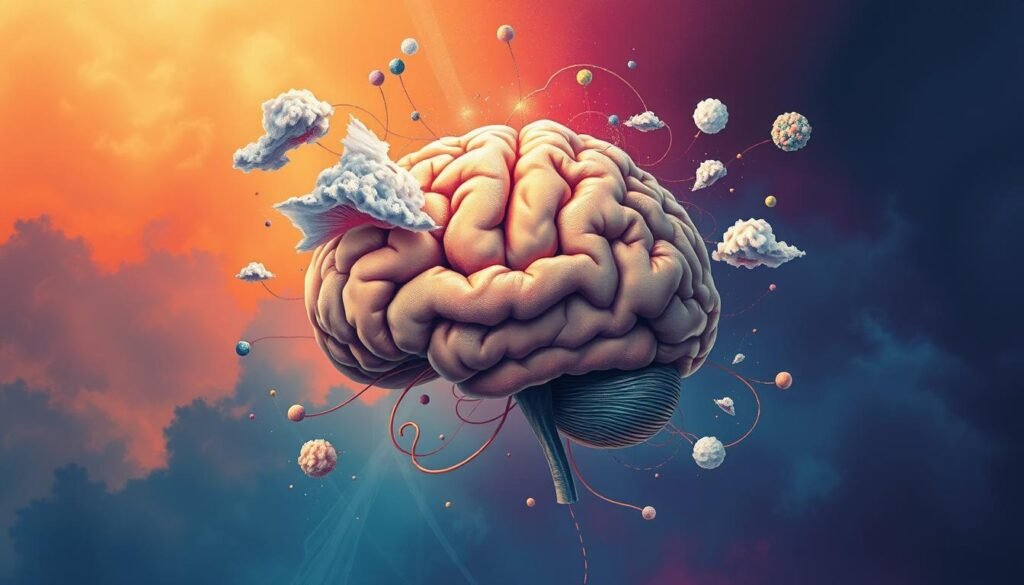About 31.1% of U.S. adults will face an anxiety disorder at some time. This fact shows how common anxiety is. But, how does it connect to neurodivergence? The neurodiversity movement started in the 1990s. It pushes for acceptance of people with brain differences, like autism and ADHD. Anxiety is common in these groups too. Yet, there’s a lot of debate about if anxiety should be seen as neurodivergent. Looking at anxiety through a neurodivergent lens helps us understand different experiences. It also shows why we need specific ways to grasp this overlap.
Key Takeaways
- The neurodiversity movement highlights the acceptance of neurological differences.
- Anxiety disorders frequently co-occur with neurodivergent conditions.
- There is no formal consensus on classifying anxiety as neurodivergent.
- Individuals with autism are particularly susceptible to anxiety disorders.
- A significant percentage of adults experience anxiety disorders in their lifetime.
- Different neurological conditions can exhibit overlapping symptoms.
Understanding Neurodivergence
Neurodivergence describes the different ways people’s brains function, especially in processing information and interacting with surroundings. It covers a range of conditions, teaching us to value differences not as problems, but as unique qualities. Autism, ADHD, and dyslexia are a few key examples. Learning about neurodivergence helps us comprehend how these conditions influence lives. It also raises the question: is anxiety neurodivergent?
Definition of Neurodivergence
Neurodivergence suggests that neurological variances are a normal part of human life. It moves us away from seeing conditions like autism or ADHD as negative. Instead, we begin to appreciate human diversity more. Neurodivergent people often excel in creativity and solving problems. By valuing these differences, we create a space where everyone’s cognitive styles are accepted.
History and Evolution of the Term
Judy Singer coined “neurodiversity” in the late 1990s, focusing on autism initially. The idea has since grown to include a variety of conditions. Through time, advocacy for the rights and acceptance of neurodivergent people has increased. This change has deepened our understanding of neurodivergence and its connection to mental health, including anxiety.
The Spectrum of Neurodiversity
Neurodiversity covers different cognitive variations. These variations result in diverse mental health experiences. ADHD, autism, and dyslexia are examples that impact how individuals interact with the world. They particularly influence emotional well-being and relationships.
Common Conditions Associated with Neurodivergence
People with neurodivergence face challenges and strengths unique to them. Key conditions within this spectrum include:
- Autism Spectrum Disorder (ASD): In the U.S., about 1 in 68 people have ASD. They often find social interactions challenging and may also have anxiety disorders.
- Attention-Deficit/Hyperactivity Disorder (ADHD): Around half of adults with ADHD struggle with anxiety. This affects their daily life and mental health.
- Dyslexia: Dyslexia makes reading tough but can lead to a knack for graphic design and engineering, thanks to good spatial reasoning.
- Tourette Syndrome: Nearly half of adults with Tourette’s deal with anxiety. This shows how mental health issues are common among those with neurodivergent conditions.
| Condition | Prevalence | Common Co-occurring Issues |
|---|---|---|
| Autism Spectrum Disorder | 1 in 68 | Anxiety disorders, social challenges |
| ADHD | 20% of population | Co-occurring anxiety, lower work self-efficacy |
| Dyslexia | Varies widely | Anxiety, lower competency levels under stress |
| Tourette Syndrome | Varies | Anxiety disorders, social discomfort |
Understanding the Neurodiversity Movement
The neurodiversity movement seeks acceptance for cognitive differences. It challenges how society views mental health. About 20% of people identify as neurodivergent. Recognizing one’s unique traits can lead to more satisfying careers and happiness.
Creating flexible workplaces is vital for inclusion. Proper support can boost job performance. Neurodivergent employees often excel in focus and productivity. They just need the right tools and understanding.
Anxiety and Its Impact on Daily Life
Anxiety disorders disrupt many aspects of life. They include different types, each with its own challenges. Learning about these can help us understand the challenges neurodivergent individuals face.
Types of Anxiety Disorders
The most common anxiety disorders are:
- Generalized Anxiety Disorder (GAD): This is worrying too much about daily life.
- Social Anxiety Disorder: This involves a deep fear of social situations, causing avoidance and panic.
- Phobias: These are strong fears of specific things or situations.
- Separation Anxiety: Often found in children, this is fear about being away from caregivers.
The Role of Anxiety in Daily Functions
Anxiety can greatly impact everyday life. It’s important for those who are neurodivergent to manage their anxiety. This helps them with work and social life. High anxiety can cause:
- Problems focusing, affecting performance at work or school.
- Not wanting to socialize because of fear of judgment.
- Sudden emotional reactions as reported in many neurodivergent children when anxious.
Having a regular routine can cut anxiety symptoms by half, offering stability. Staying active can reduce anxiety by 30-40%, boosting life quality.
About 90% of neurodivergent people feel anxious sometimes. Getting the right help is crucial. Occupational therapy and counseling make a big difference in handling anxiety.
Exploring the connection between anxiety disorders is key to supporting neurodivergent individuals.
Is Anxiety Neurodivergent?
The link between anxiety and neurodivergence raises important questions. Many wonder if anxiety is neurodivergent. This question reflects a growing interest in how anxiety relates to neurodivergence.
There’s no official agreement, but many people consider themselves neurodivergent because of their anxiety. They see their anxiety as part of their wider neurodivergent identity. This view recognizes the unique challenges they face. Challenges like trouble with social cues and managing emotions. Studies show many neurodivergent individuals also have anxiety. For instance, about 40% of people with autism deal with anxiety. And for those with ADHD, the rate is between 47% and 56%.
Social anxiety, in particular, poses a big problem for neurodivergent kids. Around half of these kids, especially those with autism, struggle with it. They often have a hard time understanding social signs. They also may have bad experiences, like being bullied or laughed at.
This link between anxiety and neurodivergence shows why it’s crucial to look at each person’s experience. Anxiety doesn’t stand alone. It comes with various neurodivergent conditions. This makes it vital to have personalized support and treatment approaches.

Anxiety Disorders and Neurodiversity
Anxiety disorders deeply impact people from all walks of life. Yet, the link between anxiety and being neurodiverse is especially key. Many who are neurodiverse, like those with ADHD or autism, often face more anxiety. This fact highlights how complex anxiety in neurodiverse people is. It shows why finding the right diagnosis and treatments is crucial.
Comorbidity of Anxiety with Other Conditions
The term comorbidity means having more than one disorder at the same time. For those who are neurodiverse, it’s common to also have anxiety disorders. This makes diagnosing and treating them more complex. For example, 50-75% of people with ADHD also have anxiety disorders. And 20-40% of those with Autism Spectrum Disorder (ASD) face anxiety too. This makes it clear how vital it is to understand anxiety in neurodiverse people fully. It’s often linked with other aspects of their conditions.
Understanding Anxiety in Neurodiverse Individuals
Neurodiverse individuals experience anxiety in unique ways. Many have sensory sensitivities that can raise their anxiety levels. About 70% say sensory overload is a big part of their anxiety. Also, changes in brain activity affect how they perceive threats and handle uncertainty. This may explain why anxiety is more common in neurodiverse people. Studies suggest they’re four times more likely to have anxiety disorders than neurotypical individuals.
Neurodivergent Mental Health
Neurodivergent mental health involves complex challenges. It links to conditions like anxiety and depression. People with neurodiversity, such as ADHD, autism, and dyslexia, often face additional mental health issues.
Exploring Mental Health Challenges
Neurodivergent individuals face many challenges. About 31.1% of U.S. adults experience anxiety disorders at some time. For those with ADHD, 60% report significant anxiety. This might be due to extra stress from social and sensory challenges.
- Research suggests around 20% of individuals with autism experience anxiety disorders.
- Approximately 50% of children with ADHD may contend with anxiety.
- The prevalence of anxiety in individuals with dyslexia ranges from 25% to 40%.
Differences in Treatment Approaches
Neurodivergent mental health care needs special treatments. Traditional methods aren’t always effective. Using approaches that fit unique cognitive styles can improve well-being. For some, modified cognitive-behavioral therapy (CBT) with activities and visuals works well.
| Treatment Approach | Typical Application | Potential Effectiveness |
|---|---|---|
| Cognitive Behavioral Therapy (CBT) | Structured sessions to address thought patterns | Effective for anxiety, but may need modifications |
| Dialectical Behavior Therapy (DBT) | Focus on emotional regulation and mindfulness | Good for mood disorders and managing anxiety |
| Art and Music Therapy | Creative outlets providing emotional expression | Beneficial for many neurodivergent individuals |

Understanding neurodivergent mental health is key. It involves knowing the challenges and finding the right care. For many, it’s about recognizing their unique needs and seeking inclusive care. This awareness leads to safer, supportive environments for all.
Neurodivergent Perspectives on Anxiety
The neurodivergent perspective on anxiety highlights how unique each person’s mental health journey is. Recognizing oneself as neurodivergent helps in understanding one’s anxiety better. It also creates a supportive space to talk about common challenges.
Self-Identification and Validation
For neurodivergent people, recognizing their experiences through self-identification is crucial, especially with anxiety. Anxiety often goes hand in hand with neurodivergent conditions. This calls for more awareness and compassion. Knowing their neurodivergent traits allows people to stand up for themselves. It helps fight against the negative views society may hold about mental health and neurodivergence.
Experiences of Neurodivergent Individuals
Dealing with anxiety, neurodivergent folks face various challenges and learn unique coping strategies. They notice traditional milestones don’t always match their life paths. Emotional ups and downs and trouble communicating can make anxiety worse. For example, around 40% of young people with autism experience anxiety. This is much higher than those without autism.
Understanding these experiences is vital. It shows why support needs to be specific and thoughtful. For more details about anxiety and neurodivergence, check out Calusa Recovery.
Managing Anxiety as a Neurodivergent
Managing anxiety when you’re neurodivergent means finding strategies that fit your unique challenges. Anxiety can show up differently for people who are neurodivergent. This makes it important to use specialized help suited to their needs.
Therapeutic Approaches to Support Neurodivergent Individuals
There are many helpful therapies for those who are neurodivergent and dealing with anxiety. Cognitive-behavioral therapy (CBT) is often successful. Research shows it helps reduce anxiety in 60% of those who try it. Occupational therapy is also useful, especially for dealing with sensory issues. About 70% who use tailored sensory approaches see anxiety decrease.
Practical Tips for Managing Anxiety
Adding simple habits to your day can help manage anxiety as a neurodivergent. Here are some strategies:
- Keeping a regular routine helps create a feeling of security.
- Trying mindfulness and relaxation methods can soothe anxiety.
- Doing creative things like art and music can cut anxiety levels by 20%.
- Practicing self-care often reduces anxiety symptoms by 30%.
Talking about anxiety issues and seeking help can empower neurodivergent people. Working with professionals and using resources from Cortica can improve coping methods. This provides a helpful system designed for their particular anxieties.

Understanding Neurodivergence and Anxiety Symptoms
It is vital to know the symptoms that come with neurodivergence and anxiety. Neurodivergent people show many symptoms that look like anxiety. This can make it hard to get the right diagnosis and treatment. Knowing about these symptoms helps everyone involved.
Typical Symptoms Associated with Neurodivergence
Neurodivergent people face unique challenges. They have:
- Impairments in social communication and interaction
- Challenges with attention and focus
- Heightened sensitivity to sensory stimuli
- Difficulty in managing executive functions
- Repetitive behaviors or intense interests
These issues can make them more likely to feel anxious. This leads to big challenges in their lives.
Overlap of Symptoms in Anxiety and Neurodivergent Conditions
Neurodivergence and anxiety symptoms often mix together. This makes the situation complicated. For example, about 40% of those with anxiety also have a condition like ADHD or autism. ADHD might raise the chances of feeling anxious by up to 30%. And, around 20% of those on the autism spectrum deal with anxiety disorders too.
Social anxiety is especially common in autistic people. It affects between 30% to 50% of them. This blend of symptoms makes it tough to tell whether the anxiety is due to neurodivergence, anxiety itself, or both. As we learn more, the way we diagnose and treat is changing. Mental health experts must stay updated on both conditions. This knowledge is key to helping those in need.
| Condition | Prevalence of Anxiety Symptoms | Comorbidity Rate |
|---|---|---|
| ADHD | 30% higher than neurotypical | Approximately 40% |
| Autism | 20% diagnosed with anxiety | 30% to 50% with social anxiety disorder |
| Dyslexia | Up to 10% significant anxiety | N/A |
The Genetics Behind Neurodivergence and Anxiety
The study of genetics and anxiety is fascinating to researchers and health experts. They are diving deep into how genes may make some people more likely to have anxiety disorders. This research is not just academic. It helps us understand mental health better.
Exploring Genetic Connections
Research shows that kids with ADHD often also have anxiety. The rate is about 30%. Genetics plays a big part in this. For ADHD, it’s between 71% and 90%. Traits of neurodivergence and anxiety often come from many genes.
Dysfunctions in the dopamine transporter gene are particularly interesting. They reveal tight links between conditions like ADHD and anxiety. Folks with autism also face many mental health challenges, including anxiety.
Role of Neurochemicals in Mental Health
Neurochemicals play a key role in our mental health. They help control our moods. If they’re off, we might feel more anxious. Recent studies in epigenetics show how life experiences affect our brain.
Things like the age of the mother and exposure to harmful substances while pregnant can impact mental health. These factors could lead to conditions like ADHD and autism. A balanced diet is crucial, especially to avoid vitamin deficiencies that can make anxiety worse. Learn more about it.
It’s also important to know environmental stress can trigger anxiety in those genetically predisposed. Understanding this can help manage anxiety better.
| Neurodivergent Condition | Heritability Rate (%) | Common Co-occurring Anxiety Disorders |
|---|---|---|
| ADHD | 71-90 | Generalized Anxiety Disorder, Social Anxiety Disorder |
| Autism | High | Obsessive-Compulsive Disorder, Mood Disorders |
| Dyspraxia | Moderate | Separation Anxiety Disorder |
Social Context and Acceptance
Understanding how society accepts neurodiversity means looking closely at how cultures see neurodivergence. Each society has its own view on neurodivergent people. These views are shaped by history, awareness, and the fight for rights. How a community sees and treats neurodiverse people depends a lot on these cultural attitudes.
Cultural Perspectives on Neurodiversity
In many places, people with neurodivergence face challenges. These come from negative ideas and stigma. Being labeled with ADHD, autism, or bipolar disorder can make others see them as “disordered.” This viewpoint can affect how they see themselves. They may find it hard to accept themselves. However, things are beginning to change for the better. Advocacy and raising awareness are showing the strengths and talents of neurodiverse people. Society is starting to understand that neurodiversity adds valuable perspectives.
Challenges in Social Acceptance
Accepting neurodiversity socially is not easy. Misunderstandings, especially about social anxiety and neurodivergence, can prevent proper support. Studies show many autistic people feel very anxious in social situations. This anxiety is much higher in autistic people than in non-autistic ones. Clearer understanding and awareness are needed.
Also, many neurodivergent people prefer spending time with others who are like them. They feel more at ease. About 70% of autistic individuals are less anxious with autistic peers compared to with neurotypicals. This shows the need for safe spaces where neurodiverse people can meet and support each other. Making real changes in how society views neurodivergence requires ongoing effort.
Conclusion
Exploring the links between anxiety and being neurodivergent reveals a complex picture. We need a deep understanding of both anxiety and neurodiversity. While experts debate if anxiety counts as neurodivergence, it’s key to recognize each person’s unique story. Anxiety stands out as a widespread mental health issue. This underscores the importance of addressing how it uniquely affects neurodivergent people.
Studies show that people with autism may experience anxiety differently. Sensory overload and sudden routine changes can trigger their anxiety. This highlights the need for specialized anxiety management strategies for neurodivergent people. Indeed, about 70% of participants in Grouport’s online therapy saw improvements. However, it’s vital to remember the wide range of personal experiences in this area.
As our society grows more accepting of neurodiversity, building community support is vital. It helps those with neurodivergence who face anxiety feel accepted. Understanding their specific hurdles can improve mental health support and strengthen the community. For more on this topic, check out the full article on neurodivergent anxiety. It encourages us to keep learning about these complex experiences.